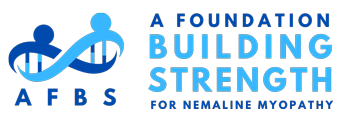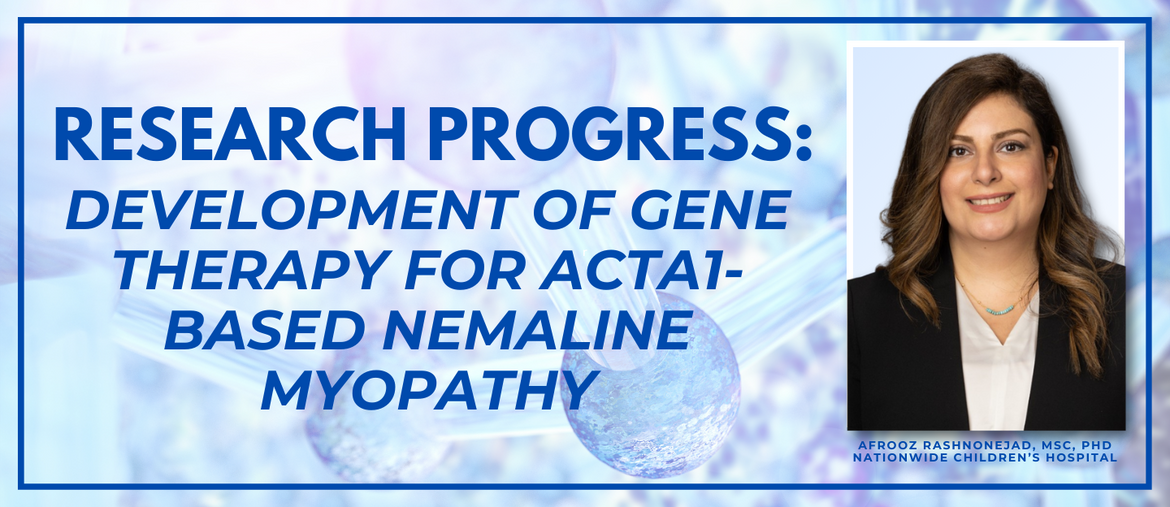There’s been exciting progress on a new approach treating Nemaline Myopathy (NM), the rare muscle disorder that causes weakness and low muscle tone. While researchers have identified twelve different faulty genes that cause NM and prevent muscles from working properly (ACTA1, NEB, TPM2, TPM3, KBTBD13, CFL2, KLHL40, KLHL41, LMOD3, MYPN, TNNT1, and TNNT3, with the most common being NEB and ACTA1), there are currently no treatments that directly target the cause of the disease.
We have hopes that may change: Dr. Afrooz Rashnonejad’s team at Nationwide Children’s Hospital (with help from a research grant funded by A Foundation Building Strength) is developing a gene therapy specifically for ACTA1-related NM, also known as Nemaline Myopathy 3 (NEM3) and are reporting significant early success 6 months in to their latest research project.
Understanding the Problem:
The ACTA1 gene provides instructions for building a protein essential for healthy muscle function. Mutations in this gene disrupt the protein’s structure and prevent it from working correctly. This, in turn, throws off the balance of other proteins in muscle cells, leading to weakness, reduced muscle mass, and breathing and swallowing difficulties.
A New Hope: Gene Therapy for NEM3
Dr. Rashnonejad’s team is pioneering a gene therapy approach for NEM3. Their strategy involves:
- Silencing the faulty gene: They’ve designed a “tool” (therapeutic genetic construct) to shut down the expression of the mutated ACTA1 gene.
- Introducing a healthy copy: They’ve also created a way to deliver a healthy copy of the ACTA1 gene into muscle cells.
Early Signs of Success:
Initial tests in simple cell models have shown promise. The research team observed a decrease in the buildup of harmful protein clumps, called nemaline rods, when they introduced their therapeutic approach. They’ve also mimicked the disease in lab dishes using human and mouse muscle cells. So far, the findings suggest this gene therapy could be an effective way to treat NEM3.
The Next Steps:
Dr. Rashnonejad and her team of researchers are now scaling up their efforts to test the therapy in live mouse models with NEM3. This will involve creating large quantities of delivery vehicles called AAV vectors, which carries the therapeutic genetic material into muscle cells. They’ll then test different doses to determine the safest and most effective approach.
Building a Brighter Future:
This research on gene therapy for NEM3 holds significant promise. While there’s still quite a bit more work to be done, these early results offer hope for a future where this challenging condition can be treated effectively. AFBS will continue to follow Dr. Rashnonejad’s progress and share updates on this exciting development!


Hello I’m a 70 year old Hispanic male who developed adult late onset about 7 years ago. Thank you for your active interest in this disease. I would like to receive current news.
Thank you! We’d be happy to add you to our email list.
How close are human trials
This project is still in the early stages of testing; we’re working with cells and soon to be testing in mice. From there, the process is complex — each step needs to show that the therapy is both safe and effective. There are also regulatory requirement considerations, and the results of these early studies will guide the timeline. While we’re making progress, it’s important to carefully evaluate each stage to ensure success. We’re hopeful about the progress being made so far and look forward to sharing more as things move ahead.
Dear Sir/Madam,
I have a daughter afflicted with Nemalin Myopathy. She is six years old. I request you to send me the latest progresses about the gen therapy of this disease.
Thanks
We’ll be happy to add you to our email list so that you receive all of AFBS’s latest research updates! We look forward to sharing more with you as our various research projects move forward!
My granddaughter is 7 years old and has Nemaline Myopathy. I would love to get updates about your research!
Thanks!
Hi Rob, we will add you to our email list to keep you informed of the latest developments in AFBS funded NM research!
WE HAVE A DAUGHTER WITH NEMALINE PLEASE SEND US THE LATEST UPDATES
Hi Moses, we will add you to our email list to keep you informed of the latest developments in AFBS funded NM research!
We have a 17 years old son affected with severe nemaline myopathy (NEB variant). It has been noted that the research and progress are focused on:
‘developing a gene therapy specifically for ACTA1-related NM, also known as Nemaline Myopathy 3 (NEM3).
Could you please inform us (or direct us to) research or accomplishments in the field for the NEB variant?
Also, we would like to recieve future publication updates via your emails/newsletters.
Thank you.
Hi Noam, Thanks so much for reaching out! AFBS has funded several research projects studying the NEB variant, including the project featured in this recently published update from Dr. Jim Dowling: https://buildingstrength.org/wp-content/uploads/sites/542/2025/04/Coulson-SkM-2025.pdf
In summary, this study, led by Dr. James J. Dowling and collaborators, addressed a critical challenge in NM research. Previous mouse models replicating the common NEB exon 55 deletion exhibited a more severe phenotype than observed in human patients due to the unintended creation of a pseudoexon leading to premature termination codons and nonsense-mediated decay.
Using CRISPR-Cas9 gene editing, the team successfully removed this pseudoexon sequence and replaced it with human intron 54 sequence containing a validated gRNA protospacer. The resulting “hmz” mice showed a 93.6% reduction in pseudoexon formation and restored stable nebulin transcript expression. These mice now exhibit key features of human NEB exon 55 deletion related NM at the physiological, histological, and molecular levels, and importantly, survive beyond the first weeks of life. This robust new model is invaluable for studying NM pathomechanisms and developing targeted therapies.
You can also find information on several other NEB studies detailed on our Research Projects page: https://buildingstrength.org/research/research-projects/ as well as our Research Publications Page: https://buildingstrength.org/research/publications/
AFBS is proud to have committed over $2.5 million to new cutting edge research projects over the next three years, and we look forward to many exciting updates!
We would be happy to add you to our email list to keep you updated on the latest developments in research! In addition, I’d like to recommend that you fill out our Community Contact Survey https://www.surveymonkey.com/r/AFBS-Contact-List so that we can connect you to resources and relevant research opportunities!
Hello,
My son was recently born on May 1st. When he was born they noticed he had very low tone and issues with breathing. Every test we did came back normal so we decided to move forward with genetic testing. The testing came back positive for TPM2 making him one of 7 people in the whole world to be diagnosed and the second youngest. We would love to know more as we have spent his 2 months of life at children’s hospital.
Hi! Thanks so much for reaching out concerning your son’s diagnosis. We’d love to connect you with resources, community support, and information to help you moving forward. As a first step, I recommend completing the AFBS Community Contact Survey found here: https://www.surveymonkey.com/r/AFBS-Contact-List. This will allow us to connect you with relevant resources and potential future studies. Additionally, we would be happy to add you to our email list to keep you informed about the latest research advances, community events, and AFBS news.
Greetings, my son (4yo) is diagnosed with NM (ACTA1 gene)
Please add me to the email list
Thank you for reaching out! We’ve added you to our email list so that you receive all of AFBS’s latest research updates. We also recommend completing the AFBS Community Contact Survey found here: https://www.surveymonkey.com/r/AFBS-Contact-List. This will allow us to connect you with relevant resources and potential future studies!